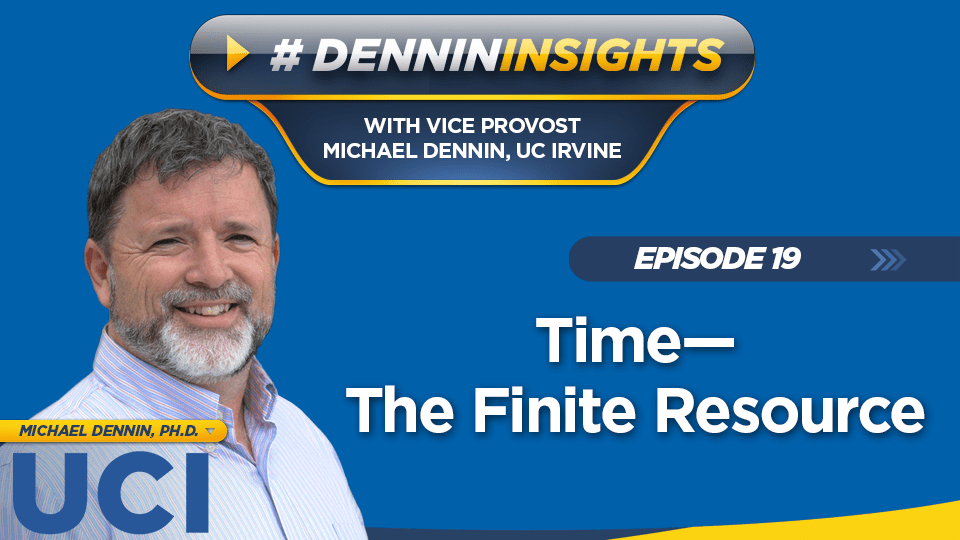
One of the most rewarding aspects of starting this blog has been the opportunity to notice trends in my own thinking that have become crystal clear through the writing process. One recurring theme that seems to come up again and again for me is the idea that time is a finite resource. This is not surprising, as many of the complaints I receive as Vice Provost have to do with the constant shortage of time. Ironically, both faculty and students do not have enough time to do everything they are asked to do, and each group thinks that the other does not respect the constraints on their own time!
I certainly understand the feeling that there is never enough time to get done what we want or even feel we need to. As a physicist, I often jokingly wonder, “If the university was actually closed (as in a closed timelike curve), could I get far enough behind on my work that I’d actually catch up?”
Bad physics jokes aside, one of the realities of the university is that there is always more that we want to do but never enough time to do it. And this makes sense; the academic process selects for overachievers in so many ways. Faculty were likely “A” students at some point in their careers, and the students at UCI were generally high-achieving while in high school. While overachieving is often a positive thing, it can make it difficult to accept that sometimes good is good enough—a sentiment that is key to time management. Well, in the spirit of saving time and accepting that good is good enough, I dedicate this post to a random collection of thoughts focused on time!
1. Faculty Are People Too
For students, it’s important to remember that instructors not only have other aspects of their job, but they also have friends, family, hobbies, challenges, occasional illnesses, and the need to eat and sleep! They cannot respond to your emails and queries 24/7. In fact, it might take them 24-48 hours to respond. So, if you anticipate needing help with something, do not wait until the last minute and assume they are available! Also, though some faculty still stay up as late as they did when they were students, you should never assume they are awake from midnight to 6:00 in the morning.
2. You Can’t (And Shouldn’t) Attempt to Master Everything
As previously mentioned, many UCI students are classic overachievers. However, in college, there are limits to what you can reasonably master in the given time frame. This is why students should pay close attention to how their courses are designed and what material is most important to learn. It may sound like strange advice, but not every aspect of every course is equally important to your experience and learning.
One of the most important skills to learn in college is evaluating how to spend your time! I know too many students that spent hours reading and underlining a physics textbook when spending a fraction of that time working on new problems would have had a bigger impact on their learning! Learn to focus on the things that maximize your learning and mastery of material, and you will get so much more out of your college education.
3. Every Student is Unique
For faculty, keep in mind the ultimate goal of your class and the undergraduate experience. Every student will absorb material and learn skills at different rates. Additionally, it’s important to remember that students are all on very different schedules. Too often, in the midst of everything we do, we focus too intently on how much students get done and how quickly they get it done. We forget that at the end of the day, it is the course and learning outcomes that really matter. So, when designing deadlines and workload, do not think only about what you want your students to do; instead, consider what you want them to learn and what you want their experience in your course to be. And, always be mindful that they have complicated schedules, including other courses, work, family responsibilities, etc., and it is worth giving thought to those realities.
4. Save Time By Using Existing Resources
During the last year, faculty have developed a considerable amount of resources while teaching remotely. I cannot stress enough that faculty should leverage these resources whenever possible! I recognize that in some classes and disciplines, it is not possible to reuse every recording or assignment. However, even in the cases where reusing existing resources may not be ideal, I suspect that it is often good enough! We need to give ourselves permission to be imperfect and remember that the time spent making something perfect is not always time well-spent because something else will suffer! We are still coming out of the pandemic, and many of us are still grappling with its effects. So let’s give ourselves a break! Let’s use what we have and spend our precious time working on new and exciting things that can meaningfully enhance the student learning experience. (Check out my previous post on recording lectures post-pandemic for some of the ways you can reuse recordings in your courses.)
To conclude, I’d like to acknowledge the fact that many of us experienced a whole new sense of time and its promises and limitations during the pandemic. For students and faculty alike, this should be a topic that we can discuss together to gain a better understanding of the time limitations we all face. And, by giving ourselves a little bit of slack and accepting that good is good enough, I think we can all find ways to make our university experiences even better.
Recent Comments